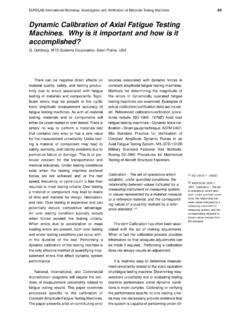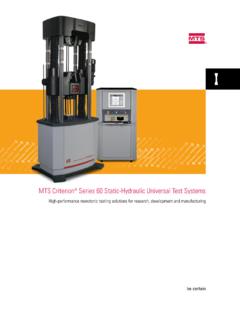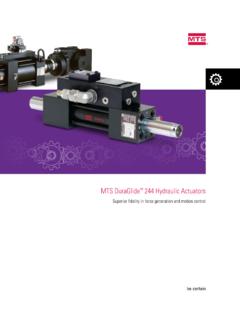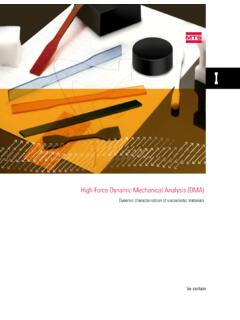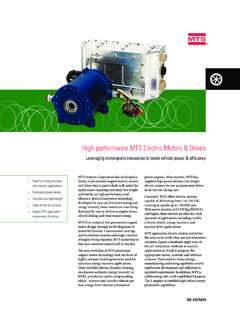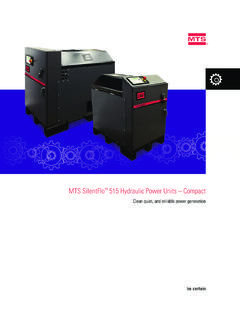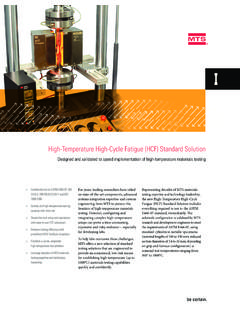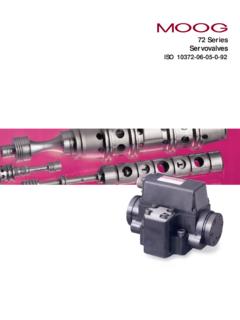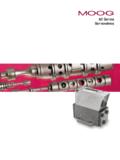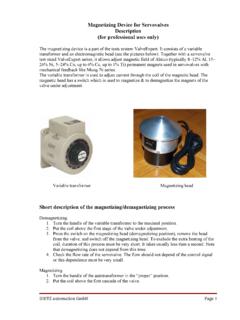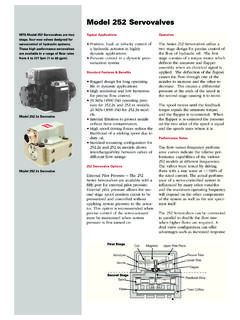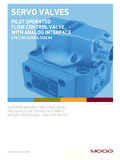Transcription of Hydraulic Fluid Care Guide - mts.com
1 LHydraulic Fluid care GuideThe performance, life and reliability of servohydraulic components is acutely sensitive to the quality and maintenance of the Hydraulic Fluid used in the system. That is why it pays to use a high-quality Hydraulic Fluid , inspect Fluid samples at regular intervals, and practice regularly scheduled preventive maintenance. By observing these simple precautions system downtime will be reduced and the overall life of the servohydraulic system will be document provides guidelines for the selection and care of Hydraulic Fluid in high-performance servohydraulic is Fluid care important? High-performance servohydraulic systems require very clean oil to maximize performance and extend the life of system components. While less sophisticated Hydraulic systems may function acceptably with lower levels of oil cleanliness, high-performance servohydraulic equipment will silt up and perform erratically when subjected to particulate levels that are greater than an ISO 4406 rating of 16/13/9.
2 Servovalves must operate smoothly and predictably to deliver the tightly regulated pressures and Fluid flow for which they are Fluid does mts reCommend? Hydraulic Fluid selection has both immediate and long-term impacts on servohydraulic test system performance. To help ensure reliable testing, the very best Hydraulic fluids must be used. MTS 30-year history of success with ExxonMobil Oil Corporation high performance DTE 20 series Hydraulic fluids establishes confidence in both the Hydraulic Fluid and the test system test systems rely on close-tolerance servovalves that operate thousands of cycles a minute and millions of cycles per test. MTS systems punish Hydraulic fluids. System valves can slice base oil and additive molecules apart during operation. Use of inferior Hydraulic fluids can result in early Fluid breakdown, and negatively impact the performance of test petroleum industry has no standard for Hydraulic Fluid base stock or additives, and available standards do not adequately reveal the distinguishing Hydraulic Fluid characteristics on which MTS systems rely.
3 Comparisons of Hydraulic fluids based on viscosity and antiwear packages only establish that the fluids meet minimal companies claims regarding the inclusion of performance-enhancing additives are undoubtedly true. Unfortunately, the quality of these adders cannot be compared due to the proprietary chemistry of their products, and a lack of standards that would differentiate between the overall effectiveness of the blended packages. The consumer is left to rely on empirical expects its test systems to be operated with superior quality Hydraulic fluids. Superior fluids aid in controlling oxidation and rust, reducing wear, collecting water, and are super-stabilized to prevent Fluid breakdown under high-pressure shear. The distinct additives used to meet this broad array of objectives by Fluid manufacturers cannot negatively influence one experience has established that some Hydraulic fluids with antiwear packages do not hold up under the harsh conditions imposed by servovalve operations.
4 Some customers have reported serious wear and performance problems when using Hydraulic fluids described as an equivalent to ExxonMobil Oil Corporation DTE 20 Series. Based on years of observation and experience MTS recommends using ExxonMobil Oil Corporation DTE 25 in high-performance servohydraulic test equipment. The superior reliability of MTS servohydraulic test systems is founded on knowledge gained through years of experience with Hydraulic fluids. ExxonMobil Oil Corporation s consistent formulation, global distribution network, and the success MTS has with ExxonMobil Oil Corporation high-performance Hydraulic fluids lends MTS great confidence in our recommendation of DTE 25. Where DTE 25 is not available, MTS recommends Shell Tellus S2 M 46. Do not mix these is tHe liFe oF a Hydraulic system sHortened? Hydraulic Fluid contamination and deterioration are normal consequences for most Hydraulic systems. Failure to adequately remove contaminants, or to change Hydraulic Fluid before severe Fluid breakdown occurs, will lead to poor system most common Hydraulic Fluid contaminants are entrapped air and water, along with particles of metal, rubber or dirt.
5 To maintain clean Hydraulic Fluid , samples must be taken regularly and appropriate mitigation should be deterioration might more appropriately be called additive deterioration. Additives give the oil its particular characteristics and because these additives are most susceptible to chemical and physical change, their deterioration is what leads to Fluid deterioration is often caused by operation at high temperatures. Fluid reservoir temperatures are best kept below 60 C (140 F). To keep Fluid operating temperatures within the acceptable range of 38-52 C (100-125 F), standard MTS Hydraulic power units are equipped with full-motor-horsepower heat exchangers, over-temperature interlocks and temperature Can Hydraulic system liFe be maximized? Regular monitoring and maintenance of the Hydraulic Fluid promotes the maximum operating performance and service life of the servohydraulic system and its components. Two specific items must be checked regularly contaminants in the Fluid and the Fluid s chemical sampling and analysis is the best way to determine whether the Fluid and filters should be changed.
6 Fluid analysis will provide an accurate viscosity reading while detecting specific contaminants such as water or foreign particles. It can also be used to check the chemical makeup of the Fluid to identify whether the additive package is still able to perform as it was originally correct evaluation of the contaminants in the Hydraulic system is important. When the contaminating material is identified, its source can be investigated to prevent future are Fluid analysis samples taken? Fluid analysis samples should be taken with the system running at normal operating temperatures. To ensure that no foreign material enters the sample, tools and containers used for sampling must be very clean. MTS has a Fluid Analysis Kit, which contains guidelines and procedures for collecting Fluid the system is installed, collect a Fluid sample and label it first test sample or benchmark sample. Have it analyzed by a laboratory, and keep the lab report on samples should be submitted for analysis at least twice every year.
7 More often if the system operates at higher temperatures or in abnormal ambient conditions. Compare new analyses with the report from the first or benchmark test sample. A schedule for changing Fluid should be developed, based on the rate of Fluid Can a Fluid sample be analyzed? ExxonMobil Oil Corporation provides Fluid analysis services, including a check of the Fluid s chemical composition. Many filter manufacturers offer similar services, giving special attention to particle counts and specific are tHe expeCted Fluid analysis results? The following table identifies the specifications for common elements of ExxonMobil Oil Corporation DTE 25 Hydraulic Fluid , as used in MTS servohydraulic applications. For Shell Tellus S2 M 46 specifications, please contact the oil Corporation DtE 25 SpECifiCationS Characteristic normal borderline UnsatisfactoryViscosity at (low) 183-193 (low) <183 104 F (40 C) 215-240 (high) 256-276 (high)>276particle count iso 16/13/9 iso 17/15/11 iso 18/16/13 Water, % by wt.
8 < > , ppm* <30 30-50 >50silicon, ppm* <15 15-30 >30 Copper, ppm* <40 40-100 >100tan mg koH/gm < > Centifugation 1-3 4-6 7-8oxidation, a/cm <3 3-4 >4*These results should be trended to watch for changes in system condition. (see page 5)If any Fluid contamination indicators are borderline, the Fluid condition might be improved by cleaning. If the indicators are unsatisfactory, the Fluid must be replaced and the system may need to be flushed. In either case, the entire system needs attention not just the Fluid in the does Clean Hydraulic Fluid look like? Looking at and smelling Hydraulic Fluid is the simplest and most effective way to determine the Fluid s Fluid is amber in color. A milky, dark, or otherwise abnormal color may indicate the presence of one or more contaminants. A milky appearance implies contamination by water. If the Fluid looks milky, take immediate action to avoid severe damage to your Hydraulic system. Stop the influx of water and remove the water from the system immediately.
9 Water can be removed by passing the Fluid through water-absorbing filters, or by flushing or draining the entire Hydraulic marked change in the smell of the Hydraulic Fluid can indicate a chemical breakdown. This type of breakdown is generally due to air that has become entrained in the Fluid , which creates varnish-like nitrogen-oil compounds that contaminate the Fluid . If a distinct change in the smell of Hydraulic Fluid is detected, have it chemically analyzed by the manufacturer. Also consult with the system s service engineer to determine if other changes or adjustments to the system are is VisCosity? Viscosity is a measure of the resistance of the Fluid to flow. A low viscosity will not provide adequate lubrication to parts, resulting in increased wear on the parts. Many Hydraulic fluids will shear or thin out with viscosity check should be made whenever Fluid samples are analyzed. If the Fluid s viscosity is outside of the specified flow limits, the Fluid should be replaced.
10 (NOTE: Viscosity varies with temperature, so a numerical viscosity value is meaningless unless the temperature is specified.)WHat is oxidation? As Hydraulic Fluid deteriorates over time, it oxidizes and produces deposits that may cause servovalves to stick. Signs of this natural process include changes in Fluid color, odor, or acidity level. Sludge, gum or varnish in the system are further evidence that oxidation has taken Fluid analysis with an ultra-centrifuge test can detect the level of oxidization. The rate of oxidization increases significantly at operating temperatures higher than 66 C (150 F). Oxidation is irreversible, and Fluid must be changed when oxidization is CHeCk For Water Content? Water is highly undesirable in Hydraulic systems. It can cause emulsions to form, and it can lead to corrosion. More than a trace of water may indicate an improper mechanical condition, poor performance of a heat exchanger or ingestion of water through the breather system operation, gross contamination of Hydraulic Fluid is indicated by a milky color.
